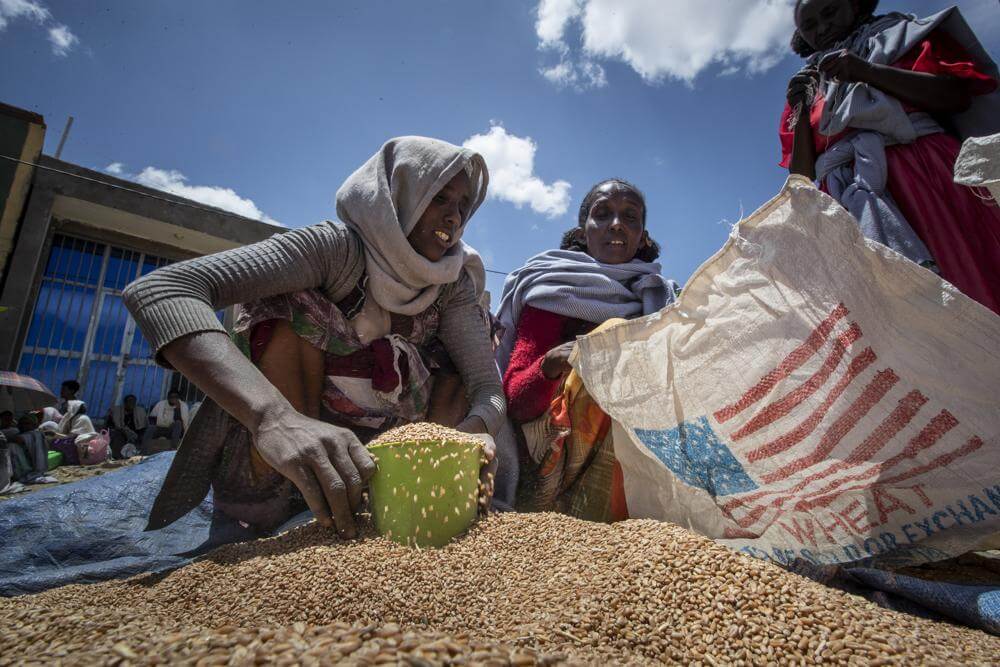Ethiopia has blamed the Tigray People’s Liberation Front (TPLF) rebels for continuing to restrict aid to Tigray, days after the government declared a unilateral humanitarian ceasefire. According to several reports, even after the declaration of the ceasefire, Tigrayans are still waiting for humanitarian aid to arrive.
In fact, Africanews reported that no food aid has reached Tigray since December last year. In this regard, the government’s communication service released a statement on Tuesday saying that while authorities have given permission to 43 World Food Programme (WFP) trucks to transport aid into Tigray, the TPLF has been blocking the road into the region.
The humanitarian situation in #Tigray, #Ethiopia is catastrophic. More than 6 million people have been sealed off from the outside world by Eritrean and Ethiopian forces for more than 500 days and counting. Starvation is being used as a weapon of war. #EndTigraySiege
— Tedros Adhanom Ghebreyesus (@DrTedros) March 28, 2022
The statement urged the rebels to “refrain from citing various reasons” and “do their part” to facilitate aid deliveries into Tigray. It also called on the international community to “put pressure” on the TPLF “to comply with their commitments to the ceasefire.”
The statement also noted that the government is doing everything within its capacity to ensure that Tigrayans receive aid, including “allowing a full week of air transportation” to several aid organisations transporting humanitarian supplies, including medicine, money, and food.
However, the government’s accusations were rejected by the Tigray rebels, who said that Addis Ababa is making “false claims” to cover up the government’s inability to facilitate aid. The rebels said that no aid had been delivered to Tigray since the ceasefire declaration and called on Prime Minister (PM) Abiy Ahmed “to go beyond empty promises and take concrete steps to facilitate unfettered humanitarian access to Tigray.”
Very mixed messaging recently from Addis. This statement confirms fed govt was restricting aid to Tigray by land and air, but claims latest blocks are due to "TPLF militants" closing Abala road. Yet we know e.g. WFP convoys delivering to Afar were looted by locals in past weeks. pic.twitter.com/HBNdG8y5hC
— William Davison (@wdavison10) March 30, 2022
Last week, the Ethiopian government announced a “humanitarian truce” in Tigray “to ensure the free flow of emergency humanitarian aid to all those in need of assistance.” The government also said that it hopes the declaration of ceasefire will “pave the way for the resolution of the conflict” in Tigray “without further bloodshed.”
The decision followed increasing pressure on Ethiopia by the international community to allow the entry of aid into Tigray. Ethiopia has been accused of deliberately trying to cut off aid into a region where millions are facing a severe humanitarian crisis. The UN has even accused the government of using food as a weapon of war and manufacturing a hunger crisis that has left millions on the brink of starvation.
Moreover, the WFP stated in January that an estimated 9.4 million people in northern Ethiopia are in dire need of food assistance and warned that the situation could get worse “owing to an unprecedented lack of funding.” It also reported that 40% of Tigrayans suffer from an “extreme lack of food,” 83% are “food insecure,” and 13% of Tigrayan children under five are malnourished.
Ethiopia has been in the middle of a severe humanitarian and political crisis since November 2020, when PM Abiy ordered a military response to an attack on a federal army camp in Tigray by the TPLF, which was declared a “terrorist” organisation by the Ethiopian parliament last year. The fighting quickly boiled over into a full-scale armed invasion by Ethiopian troops, who partnered with Eritrean soldiers in their operation.
The conflict in Tigray has killed tens of thousands of people, displaced over two million, and has witnessed grave human rights violations, including mass killings, rapes, and deliberate starvation. Both the Ethiopian government and the TPLF have been accused of committing atrocities.

